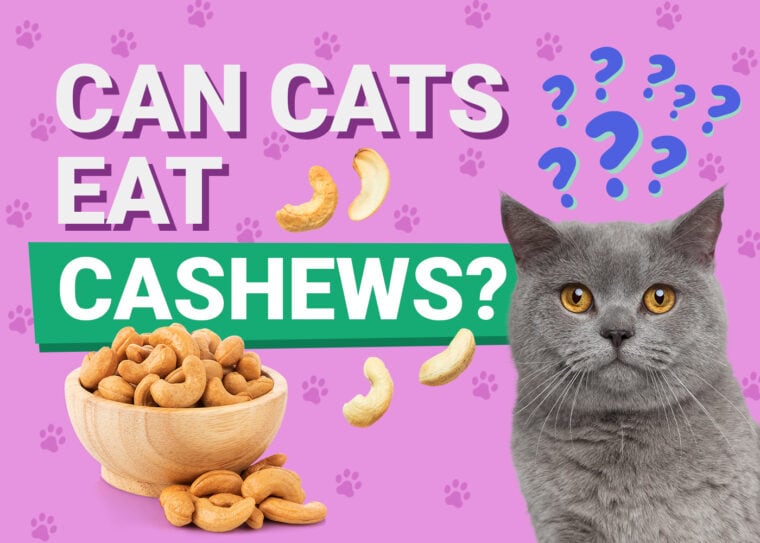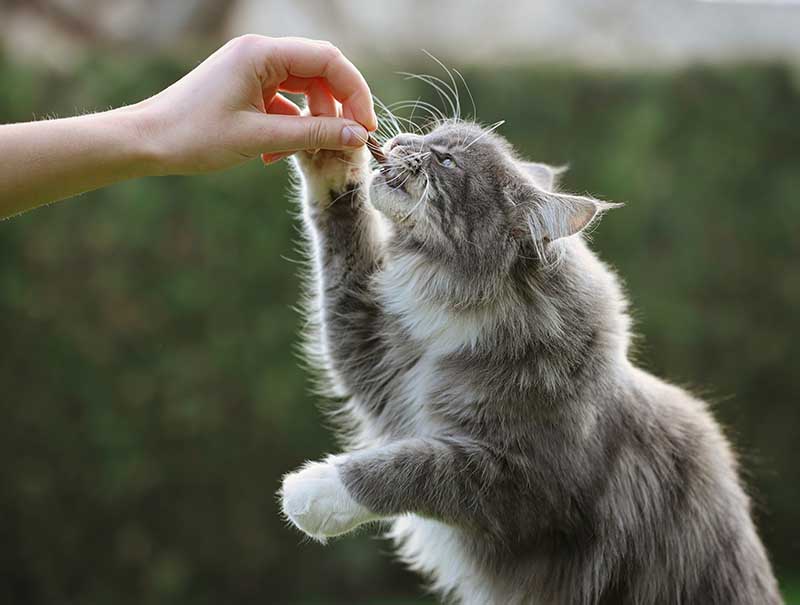
If you have a cat, you’ve probably experienced their eerie stare as you sit down to enjoy a snack. It’s the sort of unblinking gaze that pierces right through you. Despite the stoic glare, it’s obvious when our cats want a nibble of whichever food we’re chewing on whether it’s nuts, fruit, or something else.
Cashews are crunchy, light, and a simple food to eat when we’re too busy to spend time preparing something more substantial. Still, they should be avoided in cats. There are no real health benefits in the nuts for our feline friends, and there are several risks associated with it that cat owners should be aware of.
So all in all, although not toxic, they are not appropriate for your feline. Some sources state that raw cashews may be toxic to cats, but current evidence on this is limited. Still, we should err on the side of caution.
Human food is generally not appropriate for cats. Cats are obligate carnivores and should be fed primarily on meat. Unlike dogs, they can’t process a lot of plant matter like fruits, vegetables, and nuts.
Before changing your cat’s diet or introducing new ingredients or supplements that they haven’t eaten before, especially when it comes to human food, make sure to consult your veterinarian first. Every cat is different and requires an individual approach to nutrition, depending on their age, health, level of activity, and medical history.
What Are the Risks of Feeding Your Cat Cashews?
While there aren’t any health benefits to cats eating cashews, there are several risks involved in feeding them these nuts. Cats need a high protein diet to remain healthy and, despite cashews having a high-protein content, most of your feline’s nutritional needs should come from meat products.
Cashews are also high in fat and are often covered in salt making them an unhealthy addition to your cat’s diet, especially since cats don’t require as much sodium as we do. A small bite won’t do much harm but avoid feeding your cat too many. Eating cashews can lead to stomach upset, vomiting, and diarrhea due to the high fat content, and in some cats, even a small piece can cause these signs.
ASPCA does not list cashews as a toxic substance for cats, although some websites do claim that raw cashews may be toxic. It’s important to practice caution while we wait for more information to become available.

Can Cats Drink Cashew Milk?
Among many of the nut-based products out there, cashew milk is one of the more popular alternatives to dairy alongside almond and soy milk. In most cases, nothing harmful will happen if your cat drinks a little bit of your cashew milk; however, you should use the same caution when feeding them cashew nuts.
Cashew milk, and other milk made from nuts, contains a lot of fat. Too much for your cat’s nutritional needs. A sip now and then most likely won’t hurt your feline best friend but it won’t give them any obvious benefits either. Cats can also be allergic to certain nuts, including cashews, and it’s best to avoid foods you know will harm your cat, especially if they have a serious reaction to certain foods. Some cats will develop a tummy upset from just a sip of cashew or other plant-based milk.
Which Nuts are Safe for Cats?
In reality, cats should not be eating any type of nuts. It’s not meant to be a part of their diet. That said, there are nuts that can cause serious issues if eaten accidentally by a cat, and there are those that may cause a digestive upset. However, you don’t have to call the vet if your cat steals a little bit.
Some nuts may cause stomach upset in individual cats, while others will be fine. So always monitor your cat closely if they have ingested a part of a nut that is deemed generally safe, as health issues can still arise. Nuts are also frequently contaminated with mold (cashews less often than walnuts and pecans), and related aflatoxins and other harmful compounds can cause serious gastrointestinal and neurological signs in affected cats.
As we already mentioned, some sites warn against raw cashew nuts being toxic for cats, but ASPCA does not have them on their list, so we urge you to be cautious and speak to your veterinarian.
As we already discussed, while none of these nuts are directly toxic to your cat, they’re all high in fat and often flavored with sodium. Feeding them can cause stomach upset and diarrhea, and may even predispose some cats to pancreatitis, although currently, no known causes for pancreatitis in cats have been identified. The same can happen with cashews. Not to mention, all nuts can cause choking and gastrointestinal blockage in cats, and they are just not worth the risk. ASPCA recommends not offering them to your cat (or dog).
Peanuts and pistachios aren’t proven to be safe for your cat but they’re not considered toxic either. Remember all nuts pose the risk of choking, even when shelled.
As for macadamia nuts, it’s very important to avoid them completely. They’re known to cause health issues in dogs and, although it’s difficult to say whether they have the same effect on cats, it’s best not to risk it. Play it safe and if you’re not sure, give your cat specially-designed cat treats instead of the nuts you’re snacking on.

What Foods Are Toxic to Cats?
Cats may be able to steal a little bit of nut from the floor without suffering consequences in most cases, but nuts don’t have any nutritional value for them.
Raw fish and meat are also something to be wary of. If they’re not prepared properly they can cause food poisoning due to the potential of contamination with E. Coli or Salmonella, which leads to nausea, abdominal pain, vomiting, and diarrhea, while raw fish may cause thiamine deficiency in cats.
Knowing exactly what your feline companion can and cannot eat will help you become the best pet parent. Recognizing that not all cat bowls are equal is also key! The Hepper NomNom Cat Bowl sets itself apart from traditional options by catering to the specific needs of cats. The innovative design offers whisker relief via shallow dishes and promotes digestion with a slight bowl elevation. Find out if the Hepper NomNom is right for your cat by clicking here.
At Pet Keen, we’ve admired Hepper for many years and decided to take a controlling ownership interest so that we could benefit from the outstanding designs of this cool cat company!

Final Thoughts
If you’re eating a few cashews and your cat won’t stop staring at you with those hungry eyes of theirs, you should refrain from giving them any. Some types of nuts are not considered directly toxic to cats, but still, the ASPCA recommends against offering them to your kitty.
Along with the high-fat content, cashews also contain high levels of sodium and if your cat eats too many by accident, they may develop a severe stomach upset and require veterinary treatment.
When giving your cat treats, it’s always safest to stick with specialized cat treats to ensure your feline’s nutritional needs are met. Your cat’s diet should mostly consist of protein from animals so they can have a healthy and balanced diet.
Featured Image Credit: Michael_Luenen, Pixabay







